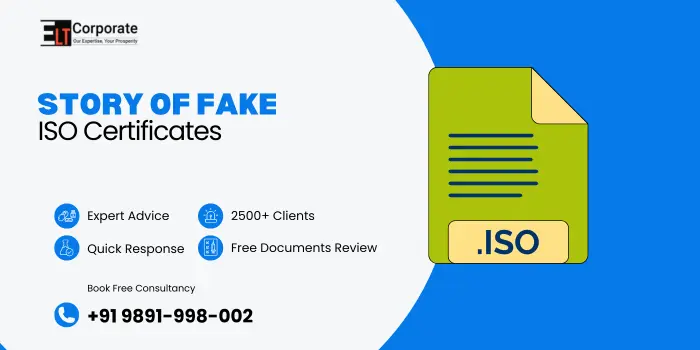ISO certificates are issued to businesses that follow international quality, safety, and efficiency standards. They help companies build credibility, enter global markets, and gain customer trust. However, in recent years, there has been a rise in fake ISO certificates, which mislead businesses, customers, and regulators. These fake certifications are often sold without any proper audit or verification, creating serious risks for industries and damaging trust in quality systems.
What Are Iso Certificates And Why Are They Important For Businesses?
ISO certificates are documents issued by accredited certification bodies that confirm a company follows certain international quality standards, such as ISO 9001 (Quality Management), ISO 14001 (Environmental Management), or ISO 45001 (Occupational Health & Safety).
They are important because they:
- Build customer trust.
- Open doors to international trade.
- Improve efficiency and reduce errors.
- Show compliance with global standards.
What Does The Term Fake Iso Certificates Mean?
Fake ISO certificates are fraudulent documents that falsely claim a company is certified under ISO standards without following the proper auditing or accreditation process. These certificates are often sold online cheaply to businesses looking for shortcuts.
Why Do Fake Iso Certificates Exist In The Market?
Fake ISO certificates exist because:
- Some businesses want quick recognition without audits.
- Unscrupulous agents sell them at low prices.
- There is lack of awareness among companies about the verification process.
- Demand for certifications in tender bidding encourages misuse.
How Are Fake Iso Certificates Created And Distributed?
They are usually created by unaccredited agencies or fake consultants who design certificate templates and issue them without proper audits. Many are sold online through unauthorized websites, and sometimes they even misuse the logos of genuine certification bodies.
What Industries Are Most Affected By Fake Iso Certificates?
Industries such as manufacturing, food processing, construction, healthcare, and exports are most affected. Many companies in these sectors need certifications to qualify for contracts and supply chains, making them a target for fake certificate sellers.
What Risks Do Businesses Face If They Use Fake Iso Certificates?
Businesses using fake ISO certificates face:
- Loss of credibility and customer trust.
- Legal action and penalties.
- Disqualification from tenders and contracts.
- Damaged reputation in international trade.
- Risk of product recalls and bans.
How Can Customers And Clients Be Misled By Fake Iso Certificates?
Clients may believe a company follows international quality standards when in reality it does not. This can lead to poor-quality products, safety issues, and loss of trust if problems arise.
What Are The Legal Consequences Of Using Or Issuing Fake Iso Certificates?
Using or issuing fake ISO certificates is a fraudulent activity. In India, companies can face:
- Heavy fines and penalties.
- Criminal charges under fraud and misrepresentation laws.
- Blacklisting from government contracts.
Which Government Or Regulatory Bodies In India Check The Authenticity Of Iso Certificates?
In India, the Quality Council of India (QCI) through NABCB (National Accreditation Board for Certification Bodies) oversees accredited certification. Also, agencies like BIS (Bureau of Indian Standards) and other regulators may verify authenticity for specific industries.
How Can Businesses Verify The Authenticity Of An Iso Certificate?
Businesses can:
- Check the accreditation body’s name and verify on IAF (International Accreditation Forum) website.
- Use NABCB’s list of accredited certification bodies.
- Contact the certification body directly for confirmation.
What Are The Common Signs Of Fake Iso Certificates?
Some warning signs include:
- Certificates issued very quickly without audits.
- No mention of accreditation body.
- Fake or copied logos.
- Extremely low prices.
- No records in official accreditation databases.
What Role Do Accredited Certification Bodies Play In Preventing Fake Iso Certificates?
Accredited certification bodies follow strict audit processes before issuing a certificate. They maintain transparency and are monitored by international and national accreditation bodies to ensure trustworthiness.
How Do Fake Iso Certificates Damage Trust In Global Trade And Quality Systems?
They create doubt among international buyers and reduce confidence in suppliers from regions where fake certificates are common. This affects genuine businesses that follow proper standards but get overshadowed by fraudulent players.
What Steps Is The Government Taking To Curb Fake Iso Certificates In India?
The Indian government, through QCI and NABCB, has:
- Launched awareness campaigns.
- Published lists of accredited certification bodies.
- Taken legal action against fake certification agencies.
- Introduced online tools to verify authenticity.
What Is The Future Outlook For Preventing Fake Iso Certificates worldwide?
The future will likely see:
- Stronger digital verification systems.
- QR-code-based certificates.
- More global cooperation between accreditation boards.
- Stricter penalties for fraud.
This will help reduce the issuance of fake certificates and enhance trust in international standards.
How Can I Quickly Check if an ISO Certificate is Real?
You can verify it through the accreditation body’s official website or the IAF database.


Comments are closed